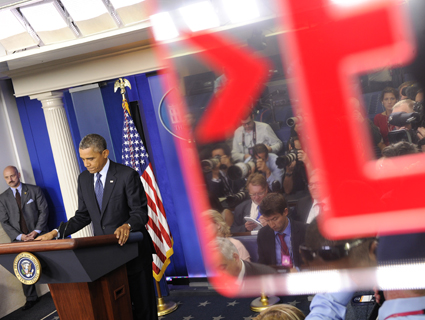
Zhang Jun/Xinhua
Republicans in the House of Representatives have had a consistent strategy during the government shutdown: Go small. In a rare display of unity from a fractured caucus, GOPers have passed a series of small bills that would fund agencies like the National Park Service and National Institutes of Health, while continuing to oppose any larger continuing resolution to fund the federal government. The idea was simple: Give Democrats the choice of either splitting ranks, or casting votes against popular (and emotionally resonant) programs.
“I say to Harry Reid in the Senate, bring this up for a vote!” said Rep. Renee Ellmers (R-N.C.) at a press conference touting the House’s bill to fund NIH cancer clinics. “Don’t take hope away from those families! Don’t take hope away from those moms!”
But House Republicans have had company. Some two dozen Democrats have voted for all or most of the nine Republican continuing resolutions, joining their colleagues to support sequestration-level funding for the NIH, National Park Service, Federal Emergency Management Agency, District of Columbia, National Guard, veterans benefits, nutrition assistance, Food and Drug Administration, and Head Start.
In some cases, the reasons for doing so seem straightforward. Fifteen of those Democrats crossover votes are included in the Democratic Congressional Campaign Committee’s “Frontline” list of the seats it will focus on defending in 2014, and eight serve in districts carried by Mitt Romney in 2012. (Arizona Rep. Ann Kirkpatrick is the only Democrat from a red district to toe the party line completely on the continuing resolution votes.) That’s the best explanation for the votes of Reps. Cheri Bustos (Ill.), Brad Schneider (Ill.), Joe Garcia (Fla.), Scott Peters (Calif.), Kyrsten Sinema (Ariz.), Ami Bera (Calif.), Raul Ruiz (Calif.), Ron Barber (Ariz.), Patrick Murphy (Fla.), Mike McIntyre (N.C.), Jim Matheson (Utah), Suzan DelBene (Wash.), Sean Maloney (N.Y.), Pete Gallego (Texas), and John Barrow (Ga.).
And two Democratic congressmen—Reps. Bruce Braley of Iowa and Gary Peters of Michigan—represent otherwise blue districts but have entered competitive Senate races.
That leaves six Democrats—Reps. Jared Polis (Colo.), Stephen Lynch (Mass.), Bill Foster (Ill.), Dan Lipinski (Ill.), Dave Loebsack (Iowa), and John Garamendi (Calif.)—from relatively safe districts, all of which Obama carried by double digits in both 2008 and 2012, who crossed party lines to support Republicans’ gimmick funding plan. So what gives?
Polis supports Democratic efforts for a clean continuing resolution, spokesman Brian Branton says, “[b]ut until that happens, he will work to make sure that our government is funded and our agencies reopen. Jared is proud to have supported a bipartisan bill that would reopen our National Parks so that the many jobs that revolve around tourism and Rocky Mountain National Park, in areas like Estes Park in Colorado, are safe.” Megan Jacobs, Foster’s spokeswoman, struck a similar note, emphasizing that while Foster opposed a piecemeal approach, “he believes if we have the opportunity to get some people back to work and services back on track, we should.” Garamendi, who voted for six mini-funding bills, released a statement on Thursday calling on Boehner to knock it off: “This is embarrassing for our country and makes our international partners nervous.”
If public opinion is any indication, though, things are looking up for the Democratic defectors. Public opinion polls have swung wildly against Republicans since the shutdown began. And on Thursday, there were signs of growing momentum for a bipartisan plan to restart the federal government, led by Sen. Susan Collins (R-Maine). Maybe House Democrats really can have it all.
















